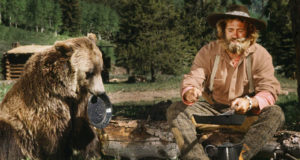Poor old Jimmy Carter. The most decent man ever to be President of the United States, yet with an irrevocable air of haplessness. His admirers, quite rightly — and with an earnestness that emulates their hero — celebrate his four-decade-long post-presidential career, during which time he has won a Nobel prize for his work in bringing warring parties together and almost totally eliminated Guinea worms. There is nothing sordid about Carter — no stain of personal corruption, no grubby post-presidential effort to enrich himself, no seats on oil company boards, no vainglorious polishing of his own legacy. No one becomes president without ambition and a measure of self-regard, yet Carter’s political rise was manifestly an extension of his lifelong dedication as a Sunday School teacher: a searching for ways to make the world a fairer, happier place.
There is even a move to re-evaluate his one-term presidency. Ejected from office in 1981 with abysmal polling numbers, the economy in a mess, and his party at war with itself, his years in the White House are now presented by his liberal fans as a triumph of far-sighted policymaking with a surprisingly enduring legacy. The distinguished political journalist Jonathan Alter has hailed Carter’s “visionary domestic achievements”. He appointed more female judges than all his predecessors put together (although, bathetically, he is the only president to serve a full term without being able to appoint a Supreme Court justice). Fifteen pieces of environmental legislation were passed on Carter’s watch, doubling the size of the national parks and providing subsidy for green energy. He liked to think of himself as a scientist (sometimes rather exaggerating his naval officer training to describe himself as a “nuclear engineer”) and recognised the impact on the climate of fossil fuels. He even installed solar panels on the White House roof (President Reagan had them ripped off, shipping one of the panels to the Carter Library, which seems like a rather pointed act of trolling).
In foreign policy, Carter’s crowning achievement was the Camp David accords in 1978 — the peace agreement signed between Egyptian President Anwar Sadat and Israeli Prime Minister Menachem Begin, a rare moment of hope in the Middle East. The accords were a genuine achievement for a modest man who nevertheless had a deep, if sometimes misplaced, faith in his ability to bring people together.
Even so: poor old Jimmy Carter. For all of these achievements, and for all his manifold personal virtues, he remains the cardigan-wearer who nagged Americans to turn the thermostat down, the lonely fisherman in a pond in his hometown of Plains, Georgia, who was implausibly attacked by a hitherto unknown creature called a “swamp rabbit”. His relations with Congress — which was, after all, controlled by his own party — were probably the worst of any president since Andrew Johnson provoked the House of Representatives into impeaching him in 1868. Tip O’Neill, the long-standing House Speaker couldn’t stand the peanut farmer from Georgia, regarding him as a provincial who thought he was above having to learn Washington’s ways. Carter once invited O’Neill to the White House for breakfast but served him cookies and coffee instead of ham and eggs. In a misguided economy drive, he stopped serving liquor at receptions. Carter gave the impression that the only reason to pass legislation was because it was the Right Thing To Do, which was almost the opposite of how Washington politicians understood it. The result was that, despite big majorities and a relatively successful “batting average” in getting bills through Congress, important legislation on health care, tax and welfare reform failed. Long lines at gas stations were an everyday testimony to Carter’s failure to grip inflation and the energy supply crisis. And with fatal political consequences, he appeared to dither over the American hostages in Tehran.
His appeal in the 1976 election was as the un-Nixon. He grinned rather than grimaced. He was a fair-haired Southerner who promised, like a Boy Scout, to do his best, who would roll up his sleeves and mend the machinery of government. It is true that back when he ran for the Georgia governorship in 1970, Carter had not been above a few pseudo-Nixonian nods and winks to segregationists, but once in office he was clear as a bell in his opposition to racial discrimination. With Carter, there was no profanity, no wiretaps, no hush-money payments, no impeachment — and no White House taping system for the benefit of future historians. So undoubtedly, he was a triumphant success at Not Being Nixon. But that is a low bar.
We can admire the rise to the presidency of someone so fundamentally honest — not least in the light of some of his successors. But the unfortunate truth is that Jimmy Carter could be excruciatingly inept at the business of politics, which is to say the business of winning power and using it. He was a prophet cast into a nation of sinners, and the trouble is he talked like one.
The best example is his so-called “malaise speech”, a televised address to the American people on July 15, 1979, which he had originally intended to be an address about the OPEC-instigated energy crisis but became instead a meditation on the “crisis of confidence” facing the nation. (He never actually used the word “malaise”, though it suited his opponents’ purposes to imply that he did). If the 1983 Labour Party manifesto was supposedly the “longest suicide note in history”, Carter’s half-hour-long sermon, mixing self-pity and moral exhortation, must have come close. Certainly, it’s hard to think of another politician who more publicly admitted failure.
In the 10 days before his address, Carter had invited a cross-section of Americans to Camp David to listen to their advice. Not just business, religious and political leaders but ordinary citizens too. He sat there in the presidential retreat soaking up their advice and their abuse and then, astonishingly, read out some of their most pungent criticisms on live TV. “Mr President, you are not leading this nation — you’re just managing the government,” one of them told him. Another said, “you don’t see the people enough anymore.” He had worked hard to enact his campaign promises, he said. And then added, rather plaintively, “but, I have to admit, with just mixed success”. Oh dear.
And then came the main body of the homily. The President paused, looked earnestly into the camera, and told Americans that “all the legislation in the world can’t fix what’s wrong with America”. There was a challenge “more serious than energy or inflation”, one that was a “fundamental threat to American democracy”. That challenge was a “crisis of confidence”.
A few weeks before this weirdly compelling, disconcerting TV appearance, Carter had met the cultural historian Christopher Lasch, whose book The Culture of Narcissism: American Life in an Age of Diminishing Expectations had been published earlier that year. Lasch argued that the decline of paternal authority and excessive consumption had fundamentally altered American culture since the Fifties. A new personality type consistent with “pathological narcissism” had been normalised. Lasch’s ideas were imprinted all over Carter’s speech. We used to be a nation that “was proud of hard work, strong families, close-knit communities, and… faith in God,” said the President. Now, “too many of us… tend to worship self-indulgence and consumption.” In a more-in-sorrow-than-in-anger tone, the President was blunt: “We’ve learned that piling up material goods cannot fill the emptiness of lives which have no confidence or purpose.”
So, what was to be done? Well that, in the end, was up to the viewers. It was hard being President, Carter was saying, and try as he might, there wasn’t much he could do about so fundamental a dislocation in American culture. Since we, the people, were the ones who had lost confidence, it was the people, ultimately, who had to get us out of the mess.
The only other speech in the canon of American presidential rhetoric comparable to Carter’s “crisis of confidence” speech is Abraham Lincoln’s second inaugural address in March 1865. At his moment of victory, with the Confederacy on the point of total destruction, Lincoln did the most extraordinary thing — he blamed everyone, Northerners as well as Southerners, himself just as much as his enemies on the battlefield, for the sin of slavery that had caused the war. Self-abasement can work as a political strategy, but to put it mildly, it’s a brave choice.
As Carter’s present-day defenders are quick to point out, the “crisis of confidence” speech initially seemed to go well. He had a polling bump. The White House received warm messages of support from citizens who were heartened to hear a president speaking the truth. But over time, the speech was reframed, as speeches always are, by the wider reputation of the speaker. For Carter’s enemies — and there were many — the speech made their case for them. “You see paralysis and stagnation and drift,” Carter said, truthfully. “You don’t like it, and neither do I.”
His great Capitol Hill rival Ted Kennedy didn’t hide his disdain: “Now, the people are blamed for every national ill, scolded as greedy, wasteful, and mired in malaise.” The youngest Kennedy brother’s decision to challenge the President in the Democratic primaries wounded Carter badly. But waiting in the wings was Carter’s ultimate nemesis, Ronald Reagan. There are some, said Reagan pointedly, in his twinkly way, who claim “that our energy is spent, our days of greatness at an end, that a great national malaise is upon us”. They say, “we must cut our expectations, conserve and withdraw, that we must tell our children not to dream as we once dreamed.”
Unsurprisingly, in the midst of inflation and unemployment, Reagan’s feel-good let-it-rip optimism crushed Carter’s earnest calls for restraint and faithfulness. In an era of close elections and intense bipartisanship, it can be startling to look at the electoral college map for 1980. Reagan carried 44 states. Poor old Jimmy Carter.
Carter was unlucky in some respects. He faced a series of interlocking economic challenges that would have daunted any occupant of the White House. But in other ways, he had a golden opportunity when he came into office in 1977. America was not at war, there was unified control of Congress, and while he faced his fair share of crises at home and abroad, there was nothing on the scale of the dramas that others faced: no big terrorist attack, no threat of a nuclear exchange, no great civil unrest, no pandemic. How on earth, then, did he end up mournfully speaking to the voters about their lack of confidence?
With Christopher Lasch’s words in his mind, Carter was not necessarily wrong about the culture of narcissism. Donald Trump, after all, is the apotheosis of pathological narcissism, his election a dystopian fulfilment of Lasch’s worst nightmare. But Carter was very mistaken if he thought that such a profound psychological and cultural shift could be combatted by earnest exhortations from the Oval Office. “This is not a message of happiness or reassurance, but it is the truth and it is a warning,” he said. Fair enough, but sometimes the larger interests of a political project require politicians to hold back the unvarnished truth. His political opponents’ characterisation of his speech as entirely negative were unfair — he ended with a painfully sincere plea for Americans to “join hands” and commit to the “rebirth of the American spirit”. But what might work in a Sunday School didn’t work in a big and complex polity, at least not when Reagan was more than willing to give messages of happiness and reassurance. Poor old Jimmy Carter.
Disclaimer
Some of the posts we share are controversial and we do not necessarily agree with them in the whole extend. Sometimes we agree with the content or part of it but we do not agree with the narration or language. Nevertheless we find them somehow interesting, valuable and/or informative or we share them, because we strongly believe in freedom of speech, free press and journalism. We strongly encourage you to have a critical approach to all the content, do your own research and analysis to build your own opinion.
We would be glad to have your feedback.
Source: UnHerd Read the original article here: https://unherd.com/




